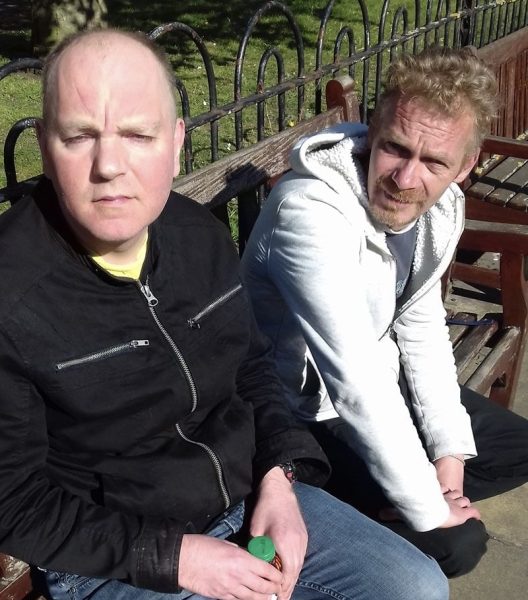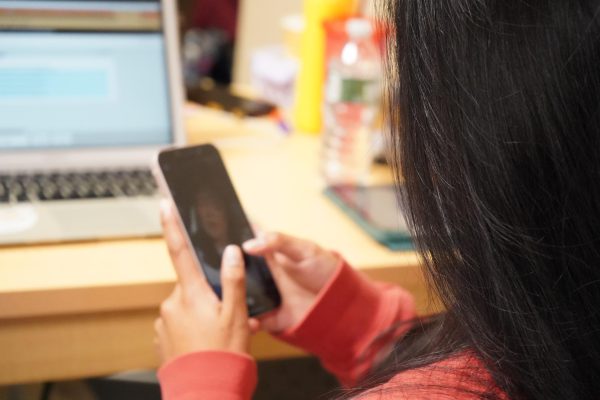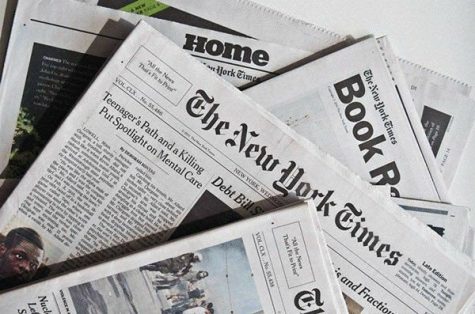Trust: Does The United States People Trust The Government?
According to a Pew Research Center poll released in May of 2021, the United States public’s trust in their government has been dramatically decreasing since the Eisenhower administration of the 1950s.
The poll concludes that public trust in government peaked in late 1964 during President Lyndon B. Johnson, and ever since then has dwindled. During the sensitive time period of this peak and the eventual fall of trust, many socio-political and cultural events occurred.
Prof. Andrej Gaspari of Mercy College believes that there are “too many factors” to take into consideration to explain this shift between Americans’ patriotism and then mistrust in their elected leaders. There isn’t one simple event to point to.
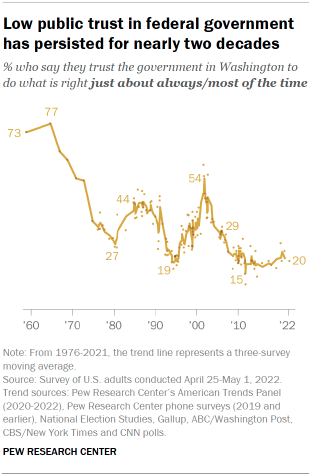
But what are those factors?
“Generally speaking,” Gaspari explained, “a combination of increased media scrutiny of government, high profile scandals, foreign policy failures, domestic political polarization, and the perception that the ever-increasing costs of government – specifically the federal government – and government programs are not money well-spent can all be seen as contributing factors.”
According to a new survey by Pew Research, American politicians run for their own personal interests (65 percent), and it does little to assist in low-income and middle-class American issues. The government posed well in handling terrorism and natural disasters, but local governments still tested more positively than the federal government (despite new critics issues concerning abortion and school curriculums).
And this strikes both parties, as 29 percent of Democrats and nine percent of Republicans state they trust the government “always or most of the time.” There is roughly 52 percent faith in government employees and 39 percent in appointees, according to the study.
When diving into the ramifications of historical events like the Kennedy assassination of 1963, the Vietnam War, and the Watergate scandal of 1972, Gaspari believes that these moments in American history without a doubt had a direct and irreversible impact on how the public viewed their federal government.
Gaspari went on to say that JFK’s assassination marked the beginning of public mistrust and eventually opened up the floodgates to Americans turning their back on politicians and leaders.
“Vietnam and Watergate both demonstrated failures of presidential leadership,” Gaspari said. “And for better or for worse, many tend to think of the president as the embodiment of the government, and form their opinions about government in general based on the actions of the person in the White House.”
These political disasters and other ones like them such as the assassinations of Martin Luther King Jr. and Robert F. Kennedy in 1968, forced Americans to reevaluate their faith in government. Gaspari also stated that the press is also an important factor to keep in mind. During the Vietnam War, journalists had virtually no limits on what they could and couldn’t report to Americans back home. This led to American citizens seeing the true raw horror of war for the first time.
“Americans became more aware of what was happening in Washington through the press, spurred by profound skepticism in their leaders created by two successive failed presidencies. With that, we can also see the seeds of increasing polarization being planted in the same period.”
But is that trust permanently lost? Gaspari doesn’t think so.
“As the poll data shows, trust in the government fluctuates…I suppose the more fundamental question is whether trust in government should be assumed to be positive. Leaders in democratic societies certainly want to be trusted. But how exactly does trusting the government serve society or the individual?”
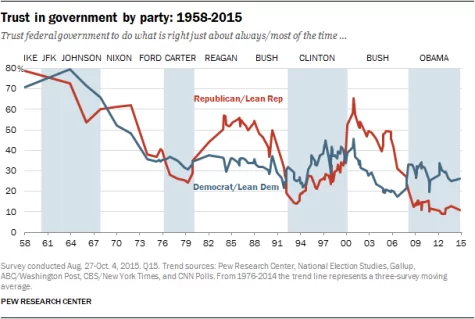
Gaspari believes that a certain amount of distrust in elected leaders is “necessary” for a democracy to function.
“The U.S. Constitution created a system that is built on limiting and distributing the power of the federal government…If the framers of the Constitution had a healthy skepticism about the ability of leaders to govern in the public interest, shouldn’t we?”
George Latimer, Westchester County’s County Executive, believes this broken relationship between Americans and their government, can one day be partially fixed.
“I think it’s repairable to a point. We’ve hit rock bottom and now we have to build back up.”
When speaking about how he sees that trust being repaired, he pointed to tools of communication like social media that have given modern politicians the ability to build a relationship with individuals. Latimer went on to say that he has personally made it a priority to be another “plastic politician” who makes empty promises and never listens.
“I have been very accessible to the public. I give presentations and Q&A’s, and I have shown a willingness to meet with organizations and public groups.”
Latimer also pointed out the fact that many elected leaders on both sides have profited due to the political divisions created.
“There’s a built-in distrust,” Latimer stated. “Some think of the other side as their enemy, this is a political advantage to many.”
Gaspari thinks a certain amount of distrust in elected leaders is “necessary” for a democracy to function. Latimer believes the opposite. Latimer states that not believing in government officials can have dangerous and destructive results.
When discussing the rise in conspiracies regarding the COVID-19 vaccine, Latimer said that “when a crisis comes, no one believes you. That built-in mistrust is damaging.”
While this is a common occurrence in 2022, giving public criticism to the government is something that hasn’t always been as strong but has simply been increasing over the decades, according to Chris Jackson, the senior vice president of U.S. Public Affairs at IPSOS.
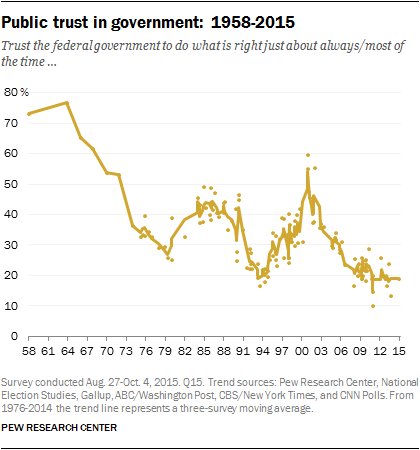
“The number of Americans who say that they have a great trust since the 1970s is probably attributable to Watergate,” says Jackson. “There’s been a gradual decline with some punctuated moments ever since to the point that now trust is at a pretty low level across the board.
When former President Richard Nixon resigned from office on Aug. 4, 1974, he did so to escape an impeachment after a failed robbery of the Democratic National Committee in the Watergate office complex – hence the name Watergate. A slew of investigative stories by Bob Woodward and Carl Bernstein showed that the former president was engaging in many forms of corruption such as trying to ruin political rivals, and paying hush money to accomplices.
The result? Nixon’s resignation as mentioned above but more importantly a shift in how citizens view politicians and the trust they have in the government.
The effects of Watergate are still strong today and have arguably got stronger with social and political trust being at a scary low, according to Jackson.
“Societies with high levels of interpersonal trust tend to be more productive and successful to be able to weather crisis so the fact that the United States is suffering from a relatively low level of trust is a problem in our ability to do a lot of big things,” says Jackson
Some of the inability for Americans to accomplish bigger issues is the ability to become united and agree on simple things such as the purity of an election. An example of this comes from the most recent 2020 Presidential election in which current President Joe Biden won nearly two years ago but there are still many who question the authenticity of his win.
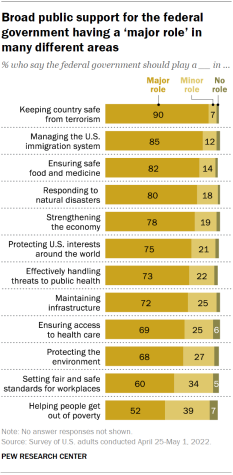
In the moments before and after Biden’s victory, former President Trump had and continues to make claims that the election was rigged by stating claims including that there were more votes than registered voters, surges in Democratic votes, votes flipped across party lines, the voting machines used at polling places were owned by democrats and that deceased people voted in the election.
Through recounts and investigations, many of those claims have come out to be false and/or unproven. Though many of the following that the former president has have refused to believe that notion. As a result, many of the claims stated by Trump are still believed to this day by his supporters and those who are unsure what to think.
“I think you have to take it from a historical perspective and there’s not one singular event it’s the summary of events over time,” says Jackson. “Republican trust in the government has certainly declined more sharply and faster than Democrats and if you look at the history of Republicanism over the past 40 years it’s not a surprise since Reagan in 1980 demonizing the government has been the center to Republican communication”
In the age of COVID-19, it has crept into nearly every aspect of life from school, work and now to politics.
Since the start of the pandemic back in early to mid-2020, questions of how the government can help combat the virus quickly began to erupt but as Jackson points out, they simply didn’t have much of an answer for the looming questions.
“We have a million people who have died from COVID and the government didn’t seem to have a good handle on what was happening,” says Jackson. “Maybe they could, maybe it was an act from God that was beyond their control but people expect the government to protect them from bad events and the government has failed”
The frustration that was placed on the government has been expressed in other topics and situations such as economic growth and prosperity.
In a poll conducted by IPSOS, they found that 87 percent of people believe that the government’s top priority should be economic prosperity. However, many might point out that despite these public concerns, the government, especially the American government, has done enough to combat these needs.
Americans are increasingly pessimistic about their ability to advance in life,” says Jackson. “They feel that they are increasingly becoming stuck, that society is becoming more rigid and there are not that many opportunities to advance.”
The frustration has led to many more questions about growth and the future of the current generation and the answers seem to be grim according to Jackson.
“You have questions like do you think you are going to do better than your parents did or do you think your kids are going to do better than you did and people are increasingly negative in how they answer that which is speaking to a lot of the inequality we see in society along dimensions of racial ethnicity and economic factors,” says Jackson.
“It’s not surprising that people don’t have a lot of trust out there,” says Jackson. “Why should they?”

Britney Guzman is a Senior at Mercy College. She writes a column called Quali-Tea News where she discusses her love for cats, Taylor Swift and mental...
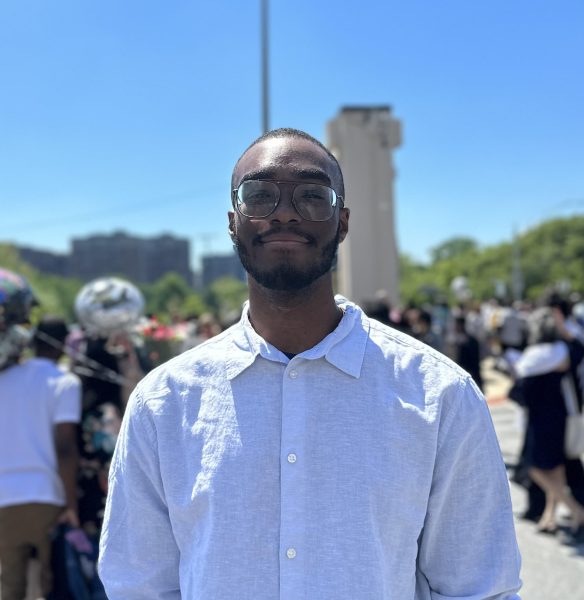
Maleek Munroe is a senior at Mercy College, majoring in communications. He graduated Nyack High School, where he found his love and passion for both...




